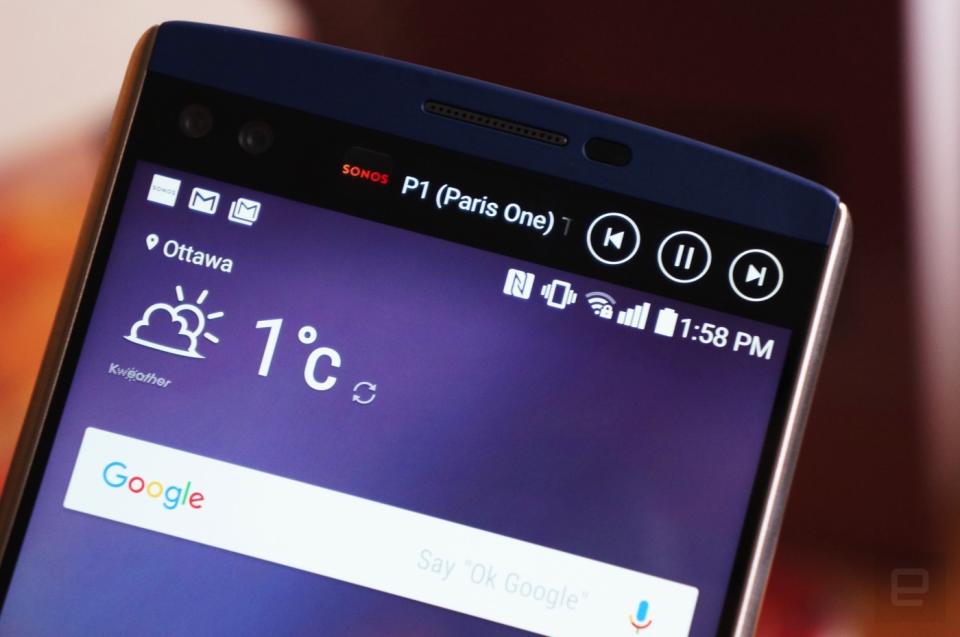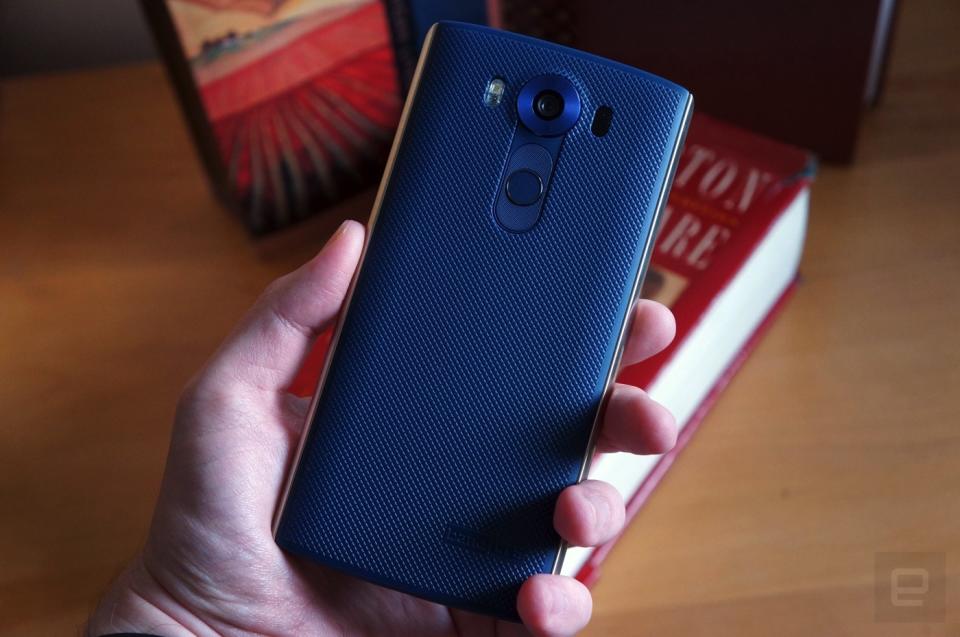Life with the LG V10 and its oddball second screen
The V10 is much better than a gimmick, but think carefully before you get one.

I was initially skeptical of LG's V10. Both the second screen and dual selfie cameras struck me as classic phone gimmicks in the vein of the Samsung Continuum or Kyocera Echo: They seem like good ideas when you're in the store, but you'll forget that they exist in a matter of weeks. But are they really that frivolous? And could the fingerprint reader, tougher body and better video recording controls come in handy, too? There's only one way to find out. I've spent several weeks living with the V10, and I was pleasantly surprised: It's clear that LG's extras can be genuinely useful. This isn't a flawless phone, though, and you'll still want to think carefully before picking one up for yourself.
I'll say this up front: The V10 has the best second-screen implementation I've seen to date. That's partly because earlier approaches tended to be utterly impractical (who actually wrote dual-screen apps for the Echo?), but I was still happier to use LG's 1,040 x 160 mini display than I had anticipated. At a basic level, it was handy for notifications. I could glimpse at a download progress meter or email subject line without having to pull down the notification bar and distract myself. The always-on passive mode was useful, too, since I could see if there was a new message without waking the screen.
As for the second-screen features that require your active attention? They're a mixed bag. I got the most use out of the audio controls, which made it easy to check track titles or start playing with just a tap. The app shortcuts helped make the most of my screen real estate, too, even if it took ages to train myself to launch apps from there instead of the main display. However, I struggled to get much mileage out of the other features. No, LG, I don't need to have my favorite contacts and upcoming appointments in constant view. The V10's extra LCD is ultimately worthwhile, don't get me wrong; it's just short on consistently useful features that would make it a must-have.
The rest of the selling points left me similarly conflicted. The two front-side camera lenses struck me as overkill, for one thing. I'm not a habitual selfie shooter, but I still struggled to justify flipping between close-cropped and wide-angle photo modes in my tests. I'd rather just leave it on one mode the entire time, and I suspect most people will do the same thing. The manual video controls are smartly rendered, letting me refocus shots or tune the white balance, but I just didn't find nearly as much need for them as I did for the equally excellent controls for still shots. They'll certainly help if you're a budding filmmaker or video blogger, but not as much if you're just trying to post a quick clip to Facebook or Vine.

The fingerprint reader, meanwhile, occasionally drives me mad. It's fast and convenient when everything works correctly, but it's both located in the wrong place (you can't use it while your phone is on your desk) and too small to be reliable. There were more than a few times where I had to tap the reader multiple times to unlock my phone, all because my fingertip wasn't placed on the power button just so. The front-facing fingerprint readers on the iPhone 6s Plus and Galaxy Note 5 are much better if you want to avoid PIN codes or patterns.
LG's much-vaunted design left me torn, too. I didn't have to test the V10's improved drop resistance, thankfully, but I did appreciate the grippier-textured back. The steel rails, however? Not so much. While they do give the handset a sturdier, more premium feel, they're somehow both slippery and prone to biting into my hands. This isn't the phone you want to hold during a lengthy call, folks. And even among large smartphones, the V10 is on the big side. The extra display and side rails result in a tall, wide device that's not very forgiving to smaller pockets.
It might sound like I'm trashing the V10, but I'm not. At its heart, it's still an extremely capable phone. The Snapdragon 808 processor isn't cutting-edge, but it and the 4GB of RAM meant that I was never hurting for performance. LG's custom interface remains distinctive without being overly burdensome, the battery life is adequate for most days and the call quality is above-average. And yes, the 16-megapixel rear camera (first seen on the G4) is superb. Combined with the manual controls, I could take photos that are difficult to manage on any smartphone, such as extraclose macros and long exposures. The V10 may not have the abundant resolution of legendary camera phones like the Lumia 1020, but it has just about everything else and then some.

Would I recommend the V10, then? That's a tough call. It's certainly the ultimate expression of LG's circa-2015 design. If you liked the idea of the G4 but wished that it had a bit more performance and resilience, you've met your dream machine. It's also worth picking over the Galaxy Note 5 or S6 Edge+ if you'd prefer a second screen, a semirugged design, a removable battery or expandable storage over Samsung's prettier bodies and (on the Note 5) stylus input. I have yet to see what Samsung's 2016 lineup will bring as of this writing, but the V10 is your best bet if you want a big, brawny phone that still lets you swap power packs and microSD cards.
The problem, as I see it, is that the V10 doesn't go quite as far as it should in justifying its existence. Unless you absolutely have to get that second screen, extra selfie cam or fingerprint reader, the G4 will get you nearly all the way there for considerably less cash. It's about as fast, takes similarly great photos and isn't that much smaller. You might even prefer it if you find the V10 too unwieldy.
Moreover, it's awkwardly timed. Unless you bought the V10 right when it arrived in midfall, you're probably better off waiting to see if the G5 gives you some of the features (a fingerprint reader and manual video controls seem like shoo-ins) on top of CPU and camera upgrades. That's not even including what rivals like HTC, Samsung and Sony might offer. By all means, get the V10 if you like it. It's a good phone whose special features usually transcend gimmickry -- I'll miss that second screen, even if it's not a lifesaver. Just know that LG's flagship won't be the top dog for much longer.




















